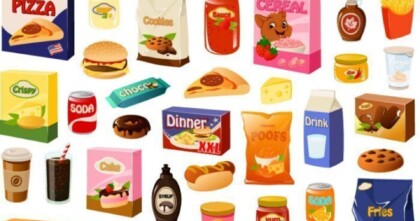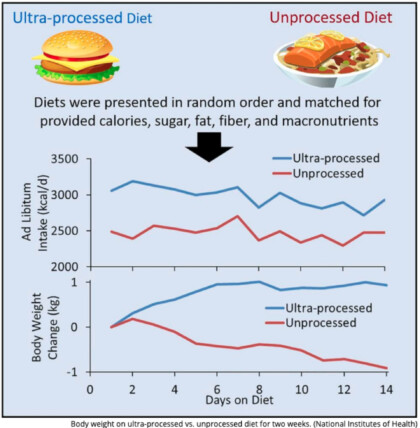News & Updates
Why Eating Junk Food Puts More Junk In Your Trunk ... (And Some Surprising Reasons You Probably Wouldn't Expect)

With New Year's resolution season in full swing, millions worldwide are looking to get in shape, lose weight, and adopt better eating habits. So we wanted to share some recent research that might help you make better informed decisions about your approach to dieting, and everyday nutrition.
(Here's a tldr shortcut shortcut to key takeaways.)
How much you eat absolutely matters, and caloric restriction definitely works. (We don't recommend it, but you can even lose weight eating only Twinkies if you're hyper disciplined about your caloric restriction.) However the flaw with a simplistic "calories in vs. calories out" approach is that it assumes that all calories are equal, and that your body responds in the same way to each and every calorie, whether it's from kale, kielbasa, or Keebler Tollhouse Cookies.
Common sense tell us that that's simply not the case. And recent research suggests that what we eat can have a far greater impact on whether or not we're able to lose weight than we might realize.
Results from recent study published in Cell Metabolism by researchers from the National Institutes of Health help us better understand how and why our bodies respond differently to highly processed foods - and why they make us fat.
The study was a 28 day randomized controlled trial that put participants on two diets that were both identical in terms of presented calories, sugar, fat, fiber, and macronutrients. Halfway through the two weeks, the groups swapped diets. Here's what the study found:
- People on a diet of highly processed foodsfor two weeksconsumed 500 more calories per day than those eating minimally processed foods (about 3,000 calories a day vs. 2,500 calories). They also gained two pounds on average during the two weeks.
- Subjects who began with 14 days of eating ultra-processed foods lost two pounds when they switched to minimally processed eating for the final 14 days.
The researchers concluded that highly processed foods cause greater weight gain - even when they don’t have more fat, sugar, or carbohydrates than healthier (non-processed) alternatives - because people on a diet of highly processed foods tend to eat 20% more calories per day than people who eat minimally processed foods.

OK, but WHY?
The study also found that participants on the ultra-processed diet consumed calories 50 percent faster than when they ate minimally processed foods. This may be because processed foods are often softer and easier to chew, swallow, and digest. Eating more quickly can cause us to overeat by short-circuiting the "gut-brain" connection that tells us when to push the plate away.
The key takeaway is that when we eat processed foods we tend to consume ~20% more calories than when we eat healthier foods. And those calories lead directly to weight gain.
Here are two more important differences between how our bodies react to processed foods:
- Research has shown that our bodies expend ~50% fewer calories digesting processed foods than non-processed foods.
- We tend to absorb more of the calories in highly processed foods than from non-processed alternatives, because minimally processed foods often include more insoluble fiber than their ultra-processed counterparts.
And if that's still not enough:
- Adults who eat less processed food are likely to have lower risk of heart disease and greater longevity, according to two recent studies published in the British Medical Journal. A 2021 Italian study also found that ultra-processed foods greatly increase the chances of an early death, especially from heart disease.
- Junk food kills off healthy bacteria in your gut and triggers harmful inflammation, according to a 2021 Dutch study.
- High-fat, high-carbohydrate diets increase risk of osteoarthritis and cause cartilage to deteriorate faster, especially in the knees and hips, according to a recent Australian study.
★ In summary, here are the key takeaways:
When we eat highly processed foods we tend to eat faster, eat more, and gain weight as a result. Our bodies expend less energy digesting processed foods, but we tend to absorb more calories from them. Avoiding processed foods is likely to lower your risk of heart disease and increase your predicted longevity. You'll also improve the health of your gut microbiome, and reduce your risk of osteoarthritis.
Are you looking to lose weight, gain muscle, change your body composition, or eat healthier? We can help! Come in for an InBody body composition scan to learn what your body is actually made of, contact us to book a free introductory Nutrition & Lifestyle Consultation or Personal Trainer meeting to learn how we can help you achieve your goals, or
Best wishes for a happy and healthy 2023 and beyond!
★ Here are the key takeaways:
- When we eat highly processed foods we tend to eat faster and eat more, and gain weight as a result.
- Our bodies expend less energy digesting processed foods, but we tend to absorb more calories from them.
- Avoiding processed foods is likely to lower your risk of heart disease and increase your predicted longevity.
- You'll also improve the health of your gut microbiome, and reduce your risk of osteoarthritis.
Are you looking to lose weight, gain muscle, change your body composition, or eat healthier? We can help! Come in for an InBody body composition scan to learn what your body is actually made of, contact us to book a free introductory Nutrition & Lifestyle Consultation or Personal Trainer meeting to learn how we can help you achieve your goals, or
Best wishes for a happy and healthy 2023 and beyond!